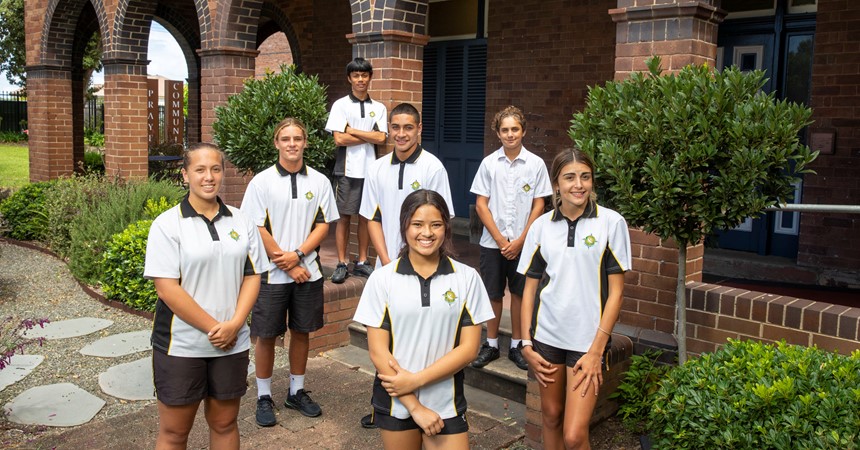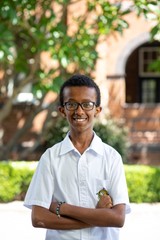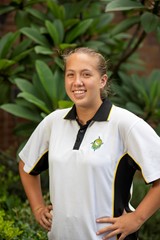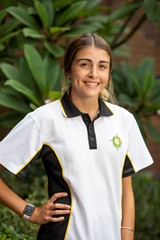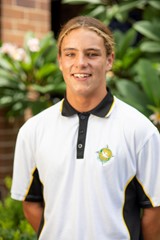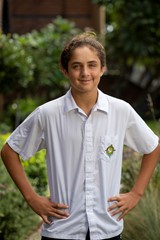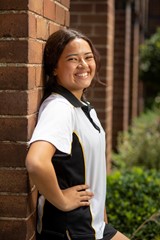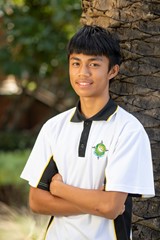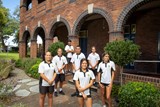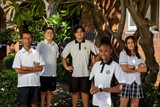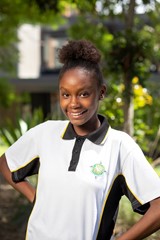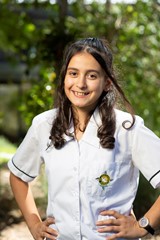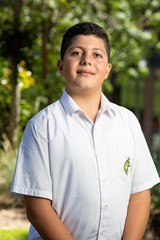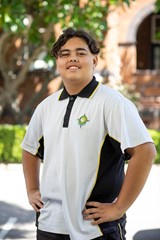School principal, Bernard Burgess, says the culturally diverse student population at San Clemente offers a unique educational experience for its students.
“Students are given the opportunity to learn alongside peers, some of whom have arrived in Australia very recently and others whose cultural heritage goes back several generations, giving them a rich educational experience in which they learn empathy, understanding and tolerance.”
Ranier Tandura
The Tanudra family moved from The Philippines to Australia in 2012. Ranier’s parents instigated their relocation to access better education for their children. While
the family has been keen to embrace many Australian customs, they have bought some of their homeland traditions with them, including mano.
“Mano is an honoring gesture,” says Ranier. “It is used in Filipino culture as a sign of respect to elders and as a way of requesting a blessing from them.” As part of mano, the person giving the greeting bows towards the hand of the elder and presses their forehead on the elder's hand. Ranier says that while he experienced some racism when the COVID-19 pandemic first took hold, he just ignored it.
“We all just need to love one another and accept our differences,” he says.
Declan O’Rourke
“I think it’s great for Australia to embrace multiculturalism,” says Declan. “Everyone can share their ideas, which will help us to grow.” Declan’s family are of Irish decent, and each St Patrick’s Day they get together at his grandmother’s home for a celebration. “I think we need to understand and accept that not everyone is the same, and embrace other people’s differences.”
Logan Aoke
Logan believes Harmony Day presents an opportunity for everyone to feel included and just as importantly, share their culture.
“There’s a lot we can learn from each other when we gain an understanding of other people’s perspectives,” he says.
Logan was born in Australia and has strong cultural influences from his father’s Samoan family, and his mother’s family from New Zealand. “On big occasions our family does the haka (a ceremonial dance), and cooks a big feast in a hangi,” says Logan. A hangi is an earth oven and has been used for centuries to feed a crowd and bring a community together. “There’s also loads of singing, and we invite our friends to come along too,” he says. “It makes me proud to share my heritage with my Australian friends and each time I do, I grow more confident.”
Logan believes Australia is an inclusive and respectful society, and that “accepting others’ opinions will only help this further”.
Dwyane Vaggs
“Harmony Day is about bringing the community together,” says Dwayne, from the Birri Gubba people. “On Harmony Day, my extended family get together and we share a feast.” Dwayne believes it’s important that we rid Australian culture of racism, and that helping each other and sharing stories will assit in achieving this.
Tanatswa Mureverwi
“I came to Australia with my family when I was one,” Tanatswa says with a beaming smile. “We came here from Zimbabwe in pursuit of more opportunities, including a better education.” Tanatswa is from the Shona tribe, and now holds a dual passport.
“Harmony means coming together as one. Everyone lives on planet Earth, and if we want to live on a good planet we need to talk with each other and be accepting of our differences. If someone comes to Australia we should talk with them, connect with them and create opportunities for them to be included.”
Rahaf Allawi
“I think it is good that Australia is multicultural as you get to learn about places all around the world, in the one country,” says Rahaf, who arrived in Australia from Syria in 2019. Her family still hold onto some of their Syrian customs, particularly celebrating the life of those lost in war.
“When people die in war we celebrate their life by having a nice meal and pausing to remember them in silence.”
Rahaf has sage advice for those of us wanting to create a more inclusive society.
“If you see someone sitting alone, go and speak to them, include them in what you are doing.”
Fahd Zarrouf
Fahd arrived in Australia from Syria in 2018 and has found it embodies a kind and respectful society.
“I like that in Australia there are rules to keep people safe,” he says, adding some advice for us to all take on board this Harmony Day.
“I’d ask people not to judge people by where they’re from. Syrians are often judged poorly because there are a few bad people, but not all of us are bad. It’s important to get to know people before you judge them.”
Biruk Tecle
“It’s important to include and respect other cultures, by being open to learning about them,” says Biruk. “I like that in Australia many people are from very different backgrounds, but we can share stories which unite us.” Biruk arrived in Australia from Eritrea in 2019. “My favourite thing about living in Australia is the opportunities we have here, and the people.”
Neshawn Wong
Neshawn was born in Australia to a mother of English descent, and a Filipino father. He says he is fortunate because celebrations are an important tradition on both sides of his family.
“I love that I am able to celebrate so many occasions.” One Filipino tradition that his family continue to observe is celebrating people’s birthdays after they die, “like they are still with us”.
Neshawn still has family in The Philippines and believes he is blessed to be living in Australia where there are increased opportunities for diversity in employment and education.
“I think that by sharing our cultures with each other we will become more respectful of each other.”
Chloe Hong
“Harmony Day is an important day for us to all come together and celebrate,” says Chloe, whose mother is Aboriginal, and father is Vietnamese.
“There’s many benefits to Australia being multicultural, including the opportunity to share our food and sport. One of the traditions my family likes to celebrate is gifting each other red pockets with money in them each New Year’s. If you don’t touch it for a year, it is said to bring good luck.”
Elle Nikas
“Harmony to me means the opportunity to live in freedom, where we all get along. I think Australia should aspire to be less racist, by providing more opportunities for everyone to get involved,” says Elle, a granddaughter to Greek migrants.
“One of my favourite cultural traditions is Greek Easter. We get red eggs and crack them on each other.”
Lani Hayter
Lani Hayter was born in Australia to a Filipino mother, who is part of the Layno clan, and an Australian father. Lani says she would love to live in a world where everyone is treated equally and accepted for who they are, believing “there is still some discrimination, including in Australia.” Lani travels to the Phillipines to see her family every couple of years and enjoys taking part in cultural traditions whilst there. Accordingly, she is looking forward to COVID-19 travel restrictions being lifted as soon as it is safe to do so.
